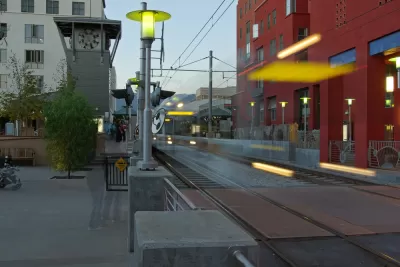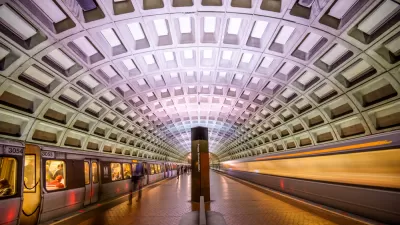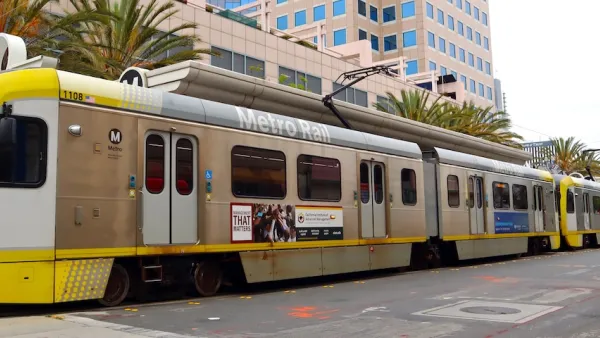Driven by a need to meet growing costs amid unstable federal subsidies, metropolitan transit agencies are eying their properties, particularly parking lots, as money makers from new residential and commercial development.

"Transit officials expect real estate to become an increasingly important revenue source, amid stagnant federal funding and rising costs of upkeep for aging systems," writes Chelsey Dulaney of The Wall Street Journal.
She describes the real estate endeavors of four major transportation agencies in the U.S. that are actively engaged in leasing properties around rail stations. While other reasons besides revenue may be a motivation, such as improving rail ridership, only revenue considerations are discussed.
- "Art Leahy, chief executive of the Los Angeles County Metropolitan Transportation Authority (Metro), said the authority has been involved in so many development that it is now one of the largest public real-estate developers in Los Angeles County, with thousands of residential units—many designated as affordable—on properties the agency owns and leases to developers. In addition to annual rent payments, Metro also has profit-sharing agreements with some developers.
- "The Washington Metropolitan Area Transit Authority’s 18-person real-estate team, one of the oldest and most established among transit agencies, both sells and leases excess land around its 91 rail stations.
- For developers, this is the best real estate,” said Stan Wall, who heads the agency’s real-estate office. “It’s the best place to be in the region.
- "Now, facing a $15 billion funding gap for its capital program, (New York’s Metropolitan Transportation Authority) has made plans to lease out or sell about (11) lots, including the agency’s headquarters in Manhattan." However, Dulaney indicates that most of the properties are "parking lots used by suburban train commuters.
- “We’ve made a huge effort to comb through our real-estate portfolio and identify parcels that could potentially be used for revenue,” said MTA spokesman Aaron Donovan
- "The Metropolitan Atlanta Rapid Transit Authority, called Marta, is negotiating leases for three parcels with developers that are planning to build more than 1,400 residential units on parking lots owned by Marta and about 50,000 square feet of retail space around Marta stations."
It may strike readers as unusual that the term, transit oriented development (TOD) is not mentioned for these developments located at rail stations. The primary motivation is not smart growth, increasing density, or decreasing vehicle miles traveled. It's income to meet growing transit needs and budgets.
Federal funding is “growing at really a very modest pace, and the bottom line is we’re not keeping up with demand to expand service or demand to replace vehicles,” said Rob Healy, a vice president at the American Public Transportation Association, an advocacy group.
FULL STORY: Transit agencies mine property developments for revenue

Planetizen Federal Action Tracker
A weekly monitor of how Trump’s orders and actions are impacting planners and planning in America.

Maui's Vacation Rental Debate Turns Ugly
Verbal attacks, misinformation campaigns and fistfights plague a high-stakes debate to convert thousands of vacation rentals into long-term housing.

Restaurant Patios Were a Pandemic Win — Why Were They so Hard to Keep?
Social distancing requirements and changes in travel patterns prompted cities to pilot new uses for street and sidewalk space. Then it got complicated.

In California Battle of Housing vs. Environment, Housing Just Won
A new state law significantly limits the power of CEQA, an environmental review law that served as a powerful tool for blocking new development.

Boulder Eliminates Parking Minimums Citywide
Officials estimate the cost of building a single underground parking space at up to $100,000.

Orange County, Florida Adopts Largest US “Sprawl Repair” Code
The ‘Orange Code’ seeks to rectify decades of sprawl-inducing, car-oriented development.
Urban Design for Planners 1: Software Tools
This six-course series explores essential urban design concepts using open source software and equips planners with the tools they need to participate fully in the urban design process.
Planning for Universal Design
Learn the tools for implementing Universal Design in planning regulations.
Heyer Gruel & Associates PA
JM Goldson LLC
Custer County Colorado
City of Camden Redevelopment Agency
City of Astoria
Transportation Research & Education Center (TREC) at Portland State University
Jefferson Parish Government
Camden Redevelopment Agency
City of Claremont





























